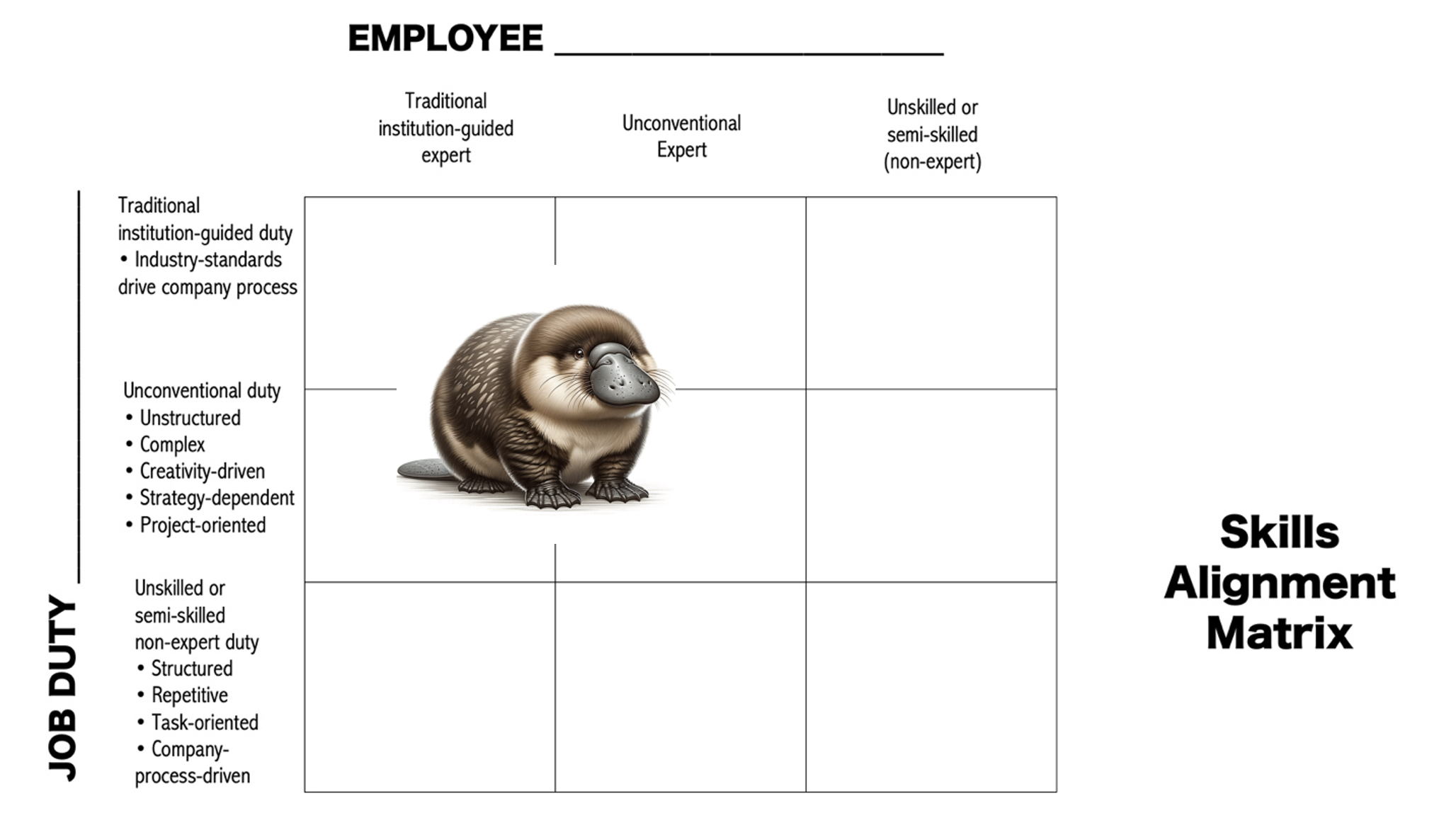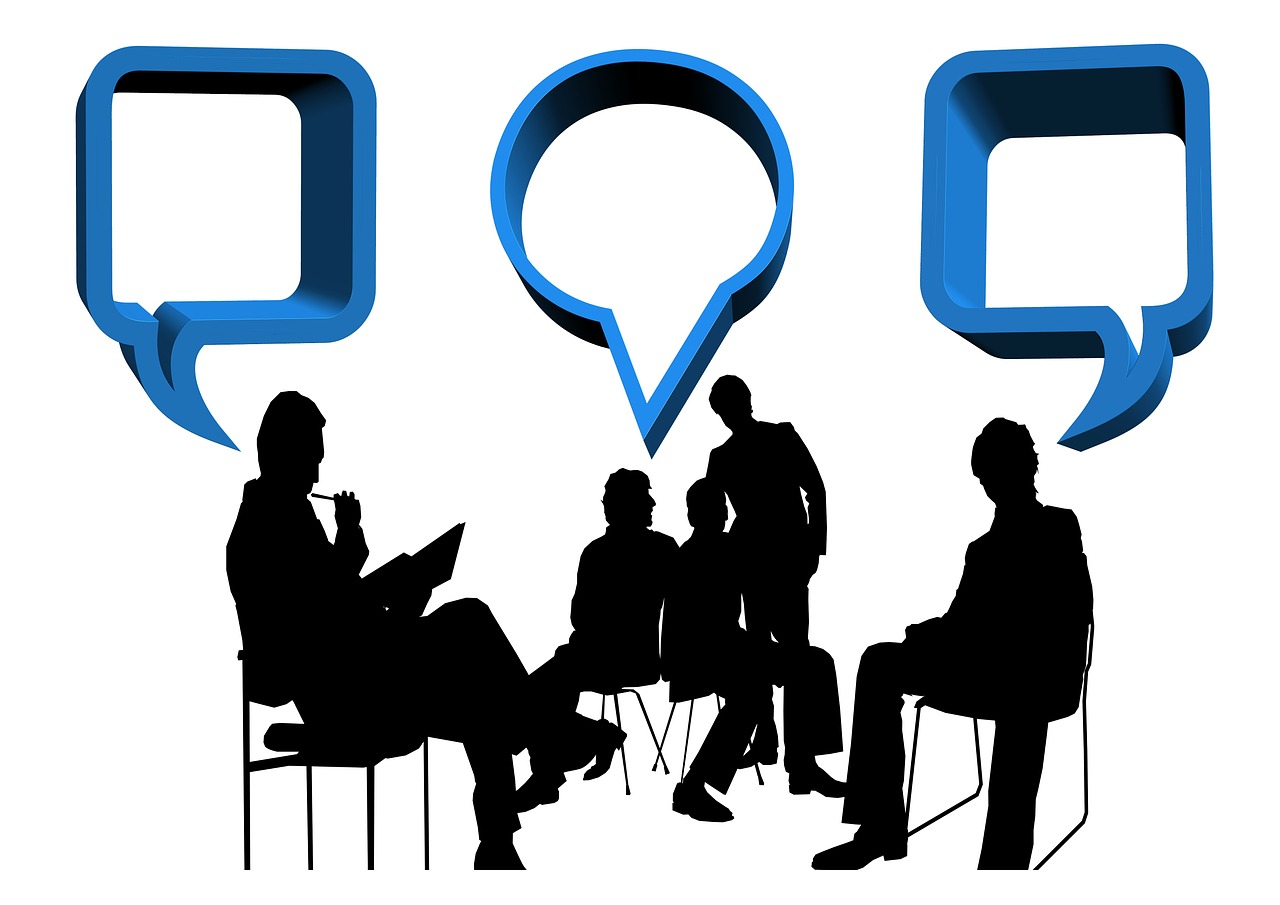Culture of Experts

Module #10
An Expert-Driven Organization
The platypus
Within the Skills Alignment Matrix, the platypus is a traditional institution-guided expert and an Unconventional Expert, both at the same time. When creating company initiatives and assigning job duties and responsibilities to projects, it is important to understand the different types of experts and set expectations accordingly.
• Traditional institution-guided experts
• Unconventional Experts
• Both (platypus)
If assignments overreach an individual’s talents, it’s important for leadership to know and understand the overreach and either allow fitting help to step in or develop skills accordingly.

In the below boxes, there are company initiatives. They show some of the questions that might come up, within each.
Company initiative: New product development and release
In developing and releasing new goods and/or services, the company will have an opportunity to possibly grow. This growth will need to be reflected within a growth plan.
Last year’s numbers
Next year’s projected numbers
Gap between the two heavily depends on customer acceptance
In a growth plan, there will be goods and/or services to fill the revenue gap and create growth. This plan touches everyone within the company responsible for developing new goods and/or services. It especially touches sales and marketing.
To put out new goods and/or services, there are usually large expenditures with little or no guarantee that there will be a positive return. Customer acceptance is crucial.
What challenges are unstructured, complex, creativity-driven, strategy-dependent and project-oriented?
What challenges will benefit from Unconventional Expert skills?
What positions will require both traditional institution-guided skills and Unconventional Expert skills (platypus skills)?
√ What problem does the new product solve?
√ How can it be taken to market?
√ Who will buy it, and in what markets?
√ How can the internet (including social media) be used to promote it?
√ What budget will it take to develop, make and support?
√ How can it be tested, before sales and in the field?
√ How can traditional product development methods be improved?
New product development and release: The pricing part of new goods and/or services
Accountants are typically traditional institution-guided experts, however, Controllers have an expertise that is completely different. They need to calculate costs and guesstimate pricing to the point of being an art. Wrong calculations will result in the loss of money due to a bad deal or loss of contract due to overpricing. Controllers, or whomever performs this task (regardless of title), are extremely important.
Product pricing – Often, pricing will fall on the marketing department. Pricing goods and services is no easy task, as they need to take company operating costs, product development costs, product costs, customer acquisition costs, all costs; and make certain they are covered within the product cost. Proper pricing, however, is more a refection of the market, what someone will pay. All of this needs to be taken into account, along with production numbers and economy of scale.
What challenges are unstructured, complex, creativity-driven, strategy-dependent and project-oriented?
What challenges will benefit from Unconventional Expert skills?
What positions will require both traditional institution-guided skills and Unconventional Expert skills (platypus skills)?
New product development and release: Focusing on marketing
Expectations are high, as new goods and/or services are being released and the company will need full sales and marketing support to get these products moving.
As the internet continues to integrate into all aspects of our lives, marketing goods and services constantly evolves. Sales strategies that worked decades ago are less effective, as people rely more on internet information, internet advertising and internet purchasing to make purchasing decisions.
What challenges are unstructured, complex, creativity-driven, strategy-dependent and project-oriented?
What challenges will benefit from Unconventional Expert skills?
What positions will require both traditional institution-guided skills and Unconventional Expert skills (platypus skills)?
√ How to tie marketing in with sales campaigns, to make for the most effective customer outreach?
√ What new markets can be discovered, following advancements in technology and changes in buying habits?
√ How can the internet (including social media) be used to convey marketing messaging?
√ What creative advertising campaigns can be formulated?
√ What’s the most effective way to manage the marketing budget?
√ How can new ideas be tested, to gauge customer reaction?
√ How can complex information be better relayed to the customer?
√ How can marketing to existing customers be balanced with new customer acquisition?
√ How can traditional marketing objectives be improved; availability, packaging, out-of-box experience, programs, etc…?
New product development and release: Focusing on sales
Sales people usually have to create their own business plan. If next year’s number are expected to be 20% higher. That 20% gap, between last year and the new year, will be the focus for this business growth plan.
Last year’s total sales
Next year’s goal (add 20% on to last year’s numbers)
Gap between the two in terms of dollars
How will the sales cover this gap?
One way to make up the gap is to have sales work 20% more hours per year. Even of this was possible, the amount of hours would eventually run, over multiple years. The business plan may get assistance from other parts of the company, perhaps there are new products being released or new marketing plans to help sell product. Even with assistance, this business growth plan will needs to involve new sales strategies.
What challenges are unstructured, complex, creativity-driven, strategy-dependent and project-oriented?
What challenges will benefit from Unconventional Expert skills?
What positions will require both traditional institution-guided skills and Unconventional Expert skills (platypus skills)?
If salespeople do not have platypus skills (which they often don’t), how can traditional institution-guided experts within the company help them?
√ Where can additional points of person-to-person contact be targeted, where sales can communicate with customers?
√ What new markets can be discovered, following advancements in technology and changes in buying habits?
√ What new and creative sales campaigns, sales strategies and sales pitches can be formulated?
√ What marketing programs can include sales, for a higher return?
√ How can the internet (including social media) be used to assist the sales process?
√ How can new ideas be tested, to gauge customer reaction?
√ How can complex information be better relayed to the customer?
√ How can the customer database be improved to help customer outreach?
√ How can point-of-sale purchases be made easier?
√ How can commissions incentivize the highest profit sales?
√ How is account management for existing customers be better balanced with new business development?
Years ago, heavily focusing on sales was said to be the most impactful company strategy, as sales people are the closest to the money. Today, with the internet being both an information machine and marketing machine, the old art of sales is constantly trying to find its place within the new world. Certainly, there will always be situations that greatly benefit from person-to-person customer communication; determining how, what, where and when is the challenge.
New product development and release: The production part of the business growth plan
Production is different than sales, marketing or product development. Production is a machine that has to eat what is fed to it. The traditional institution-guided experts uphold process, which is very important and with little room for error. Machine shops are a part of production, however, their top experts are usually Unconventional Experts, overcoming challenges that are unstructured, complex, creativity-driven, strategy-dependent and project-oriented. This is mostly seen as the fabrication or machining of parts that very complex. In the machine shop, where workers manipulate physical objects, it is inherently easy to see the difference between unskilled/semi-skilled workers and Unconventional Experts. Assigning the right skills to the right tasks is not rocket science.
New product development and release: Talent acquisition
Finding talent (search) – recruiting for new talent is no easy task. Placing job postings and reviewing resumes is a relatively basic task, however, one who is very good at it can attract high quality candidates by using specialized techniques. Advanced recruiting includes advanced searches for talent, usually using LinkedIn. These skills are at an expert-level.
Interviewing talent – Interviewing talent is very different than finding talent. Interviewers are usually hiring managers and HR professionals. There are often advantages in the searching expert and interviewing expert being different people, as there is a slight conflict of interest; one bringing candidates in, the other weeding them out.
What challenges are unstructured, complex, creativity-driven, strategy-dependent and project-oriented?
What challenges will benefit from Unconventional Expert skills?
What positions will require both traditional institution-guided skills and Unconventional Expert skills (platypus skills)?
If talent recruiters (search experts) do not have platypus skills (which they often don’t), how can traditional institution-guided experts within the company help them?
Let’s look at how Unconventional Expert ability can solve the challenges outlined above. The below pairing sheet can be filled in for the following positions:
Sales
The sales managers (or sales people) developing sales strategies
Sales people administering sales strategies and making course correction as needed
Marketing
Marketing managers developing high level initiatives
Marketing geniuses coming up with specific ideas
New product development
Company leadership to set the vision
Marketing managers and product managers to create products
Engineering/technical people to make products work
Production
Operations leadership to make production efficient
Key position / key expert pairing box
Key position name: __________________________________________________
Key employee (or candidate) name, who fills this position: ________________________________________
Official title: _________________________________________________
Department and specific position:
[ ] Sales ________________________________________
[ ] Marketing ________________________________________
[ ] Product development ________________________________________
[ ] Production ________________________________________
List position’s key responsibilities. These might be traditional items listed on a generic job description. These might include CAD design Mechanical Design Engineer, analysis for a Test or QA position, networking for IT Professional. The task name might be built into the title; e.g. accounting for the Accountant.
1)
2)
3)
4)
5)
List position’s secondary tasks. These might also be on a generic job description, although, they may not be hard requirements. These tasks might include computer skills, documentation, reporting and customer meetings. These tasks might be considered unskilled or semi-skilled work, as they can be learned within a relatively short period of time. Tasks are structured, repetitive, task-oriented, company-process-driven.
1)
2)
3)
4)
5)
List employee’s (or candidate’s) top traditional institute-guided skills and abilities to complete all of the above. This should be from both educational and experience related sources.
1)
2)
3)
4)
5)
List positions unconventional responsibilities and tasks, those that are unstructured, complex, creativity-driven, strategy-dependent and project-oriented. If it is difficult to express these responsibilities and tasks, use the above questions within the above yellow boxes to help with this list.
1)
2)
3)
4)
5)
For each of the above responsibilities and tasks, list employee’s (or candidate’s) Unconventional Expert abilities to accomplish them, using their individual work-process itemized below. This will take some time and a separate sheet of part, however, it should show insight into who can do what, to cover special needs within your organization.
1) Foster curiosity –
2) Initiate activity –
3) Gain relevant information –
4) Discover possibilities –
5) Strategize –
6) Commit to a project –
7) Create ideas –
8) Realize ideas –
9) Test ideas, find success or failure –
10) Use failure as a platform for new and better ideas –
11) Repeat part or all of the process –
12) Eventually, find achievement –
Bonus – Ultimately, gain some level of mastery –
Clayton the missing link:
Clayton’s is a missing link. He currently works in the marketing department, but has the sales person ability to create new sales campaigns, sales strategies and sales pitches. In his off time, he buys and sells specific types of landscaping equipment. Through trial and error, he learned how to buy sell and trade, and knows how to repair common issues that make the equipment useless to some people, driving the price down. After making repairs, he can sell for top dollar. Getting to this point used all of the items listed within our individual work-process, and he can easily provide examples for each.
Clayton’s skills are not wasted in the marketing department, however, his abilities are not being utilized to the fullest. Using this talent formula, other options can be more easily seen.
Where is the task now and where do you think it should be?
The Task Matrix is an easy way to map out key tasks in a visual manner to make sure they are placed in the right hands. Simply add an existing task in red, where it is now. Then, add the same task again in green; where it makes sense to be. If the tasks are not in the same square, there are two options. Move the task to a different employee or train the employee to take on the task. CareerSteady.com is our employee training website, designed to help employees take on tasks that might otherwise be beyond their scope of commitment.
In the below example, the same employee will cover the task. This employee will need to step up.

In this second example, the decision was made to cross lines, handing off the task to a different worker.

Company meetings
As Unconventional Experts forge their own path, leadership will need to make sure that their achievements are moving in a direction that is advantageous to the company. In t his module, we will look at ways to assure forward progress, when initiating a Culture of Experts.
Company meetings and Unconventional Experts
It is always recommended that leadership meet with employees within regular one-on-one meetings. Discussions usually include a status or progress report and plans for next steps. When meeting with Unconventional Experts, a review of the individual work-process can aid in the sharing of information that is often disregarded.
Manager asks employee:
a) What captured your interest? Intellectual curiosity
b) What new activities did you put into motion? Initiate activity
c) What new relevant information did you gain and from what source? Gain relevant information
d) What possibilities did you see, that could benefit customers in the long run? Discover possibilities
e) What new game plans did you develop? Strategize
f) What project updates are there? Commit to a project
g) What new ideas did you come up with? Create ideas
h) How did you develop your best ideas and how did that translate into productivity? Realize ideas
i) What ideas did you test and what was the test? Test ideas, find success or failure
j) What ideas failed? Test ideas, find success or failure
k) What did you learn from the failed ideas and what new ideas did they lead to? Use failure as a platform for new and better ideas
l) What parts of the process did you repeat, to duplicate successful activities? Repeat part or all of the process
m) What achievements did you have? Eventually, find achievement
n) What progress have you made on your expert-trek, to find mastery? Ultimately, gain some level of mastery
We can also add two attributes of unconventional positions (module #1), to add to the information exchange.
Manager asks employee:
• What unstructured facets of your position where challenging and how did you face the challenge? Unstructured
• What new levels of complexity did you reach within your position and how were you able to adapt? Complex
Regarding project updates, if work is encapsulated within an unconventional project (module #6), updates can be specific.
Manager asks employee:
• Summarize the movement of the project?
• Are there any adjustments to the project’s expectations and goals?
• What benefits does the project bring to the company?
• What influence does the project have on personal growth?
• What customer reach, market reach or internal department interaction has the project generated?
The power of mastery
In module #3 we saw how important it is for Unconventional Experts to have a realistic understanding of the level of commitment required to reach some level of mastery. Over time, there should also be a deep respect and reverence for mastery and the Masters who achieve it. Leadership should continually romance the concept of Master-level performance and make certain that their experts are not delusional; as they compare their skills and achievements to those who stand at the top of their vocation.
Manager asks employee:
• Of those who share a similar expert-trek, what exposure have you had to top performers?
• How far away are you from achieving a similar degree of mastery within your career?
• How will you develop your expertise differently?
Free-time activities
In module #3 we looked at the Unconventional Experts in their free-time, as they forwarded hobbies, arts, crafts, DIY home improvements, connoisseurship, inventions and disciplines. As long as the employee is comfortable with the conversation, comparing personal experiences with workplace experiences can be beneficial. It should be a goal of leadership to make sure that their employees are as confident at the workplace as they are at home.
Work-journey check-up
The individual work-journey is the chemistry between the worker and the work. If the work-journey is not positive, there will be limited job satisfaction and the quality of work will suffer. For Unconventional Experts, the level of curiosity and ability to either fulfill or expand curiosity will play a big role in the health of their work-journey. If there are company barriers that stand in the way, there should be efforts to remove or minimize them.
Sparking employee curiosity:
• Abbreviate and share all interesting industry information.
• Have employees attend trade shows and conferences.
• Expose employees to the marketplace where goods and services are sold.
• Share stories where company goods or services have helped end-customers.
• Dedicate time to meetings, where employees can share work-journey stories.
• Expose employees to master-level experts, relevant to their position.
Expert-trek check-up
Within most organizations, employees are rated within formal quarterly and yearly performance reviews. These reviews cover a lot of ground, however, they rarely review an employees level of expertise and mastery. As difficult as it is to rate these qualities, expert-trek progress should be reviewed on a regular basis.
Manager asks employee:
• What achievements have you made within your position, as compared to similar positions within the industry?
• What unique abilities do you offer to your position, as compared to similar positions within the industry?
• What ideas or philosophies do you hold, that might be considered unorthodox to the industry?
• What industry knowledge do you have, that not typically found within publications or reports?
• What unique situations have you experienced, as compared to similar positions within the industry?
• Where are you in your pursuit of mastery, as compared to those at the top of their vocation, within similar positions within the industry?
Troubleshooting an issue within a Culture of Experts
• Was the issue within operational company-process or within an individual work-process?
• If operational company-process failed, can future issues be diverted by changing it?
• How did the failure fall within each of unstructured, complex, creativity-driven, strategy-dependent, project-oriented work?
• Can any of the above be fixed by, or transformed into; structured, repetitive, task-oriented, company-process-driven work?
• If individual work-process failed, where was the failure and how can it be addressed?
1) Foster curiosity
2) Initiate activity
3) Gain relevant information
4) Discover possibilities
5) Strategize
6) Commit to a project
7) Create ideas
8) Realize ideas
9) Test ideas, find success or failure
10) Use failure as a platform for new and better ideas
11) Repeat part or all of the process
12) Eventually, find achievement
Bonus – Ultimately, gain some level of mastery
• Are the expectations too high, requiring too much in the way of individual work-process?
• How can workers be assisted in meeting the requirements that will help avoid similar issues, moving forward?

Communication Takes Time
A small team met with the CEO for three hours. It took three hours to explain one complex concept that had many facettes. After three hours, everyone understood. Leadership means taking the time to completely communicate vision. Leadership requires communication.
Unconventional manipulation
Within a company’s quarterly meetings, the CEO earned a reputation for being uncomfortably judgmental when fielding employee questions and responding to their contributions. Often, he would use these exchanges to highlight individual inadequacies and team weaknesses. Employees became hesitant with their participation, but knew that it was mandatory. A small group of the employees discover that they could slightly manipulate these meetings by presenting contrived positive contributions, one-each, on a relatively grand scale. As each performed, the others would silently nod with appreciation. Over time, they perfected this strategy and where able to change the flavor of the meetings.
Outside of a Culture of Experts, Unconventional Experts hide. Outside of productive change, Unconventional Experts are instrumental in change.

Communication Through Stories
Everyone loves a good story. For both children and adults, it is the best way to share situational information. For a candidate within an interview, conveying a work experience within a short story can be priceless. Like every children’s story, it should include the obstacles and the way in which they were overcome.
Assessing Opportunity
Looking at a new opportunity of any type means:
• Assessing time risk as well as monetary risk.
• Determining worst case scenarios. These can includes potential legal ramifications, mental health sacrifices and a potential breach in reputation.
• Determining best case scenarios. Remember, net gains might also include increased knowledge and expansion of ideas.

The finishing touch to a Culture of Experts
Initiating a Culture of Experts and adopting the concepts within this program means to change the way a company views and utilizes its human capital. Words have power, and including these descriptive names within the company lexicon will go a long way.
Culture of Experts
Unconventional Expert
Unconventional position
Unconventional project
Individual work-process
Company work-process
Work-journey
Expert-trek
Corporate Culture Assessment Questions
Module #10 – An Expert-Driven Organization
18) Do you think that is would benefit your company to adopt a Culture of Experts?
See all of the module assessment questions in module #11
Culture of Experts Interview Questions
Module #10 – An Expert-Driven Organization
Currently, there are no interview questions for this module.
See all of the module interview questions in module #12
Please proceed to module #11: Corporate Culture Assessment
Grow a Culture of Experts as you expand your company, use our recruiting services to fill your next open REQ. Go to ww.humancastle.com and call us at (716)222-3535.
© 2025 Human Castle LLC, unauthorized duplication is a violation of applicable laws.
